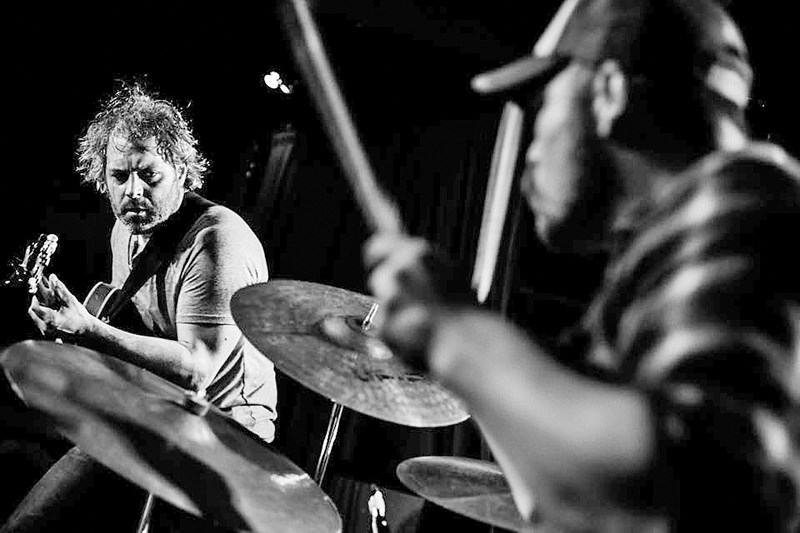Gordon Grdina Septet featuring Jon Irabagon at The Ironworks tonight at midnight; Haram with special guest Fredrik Ljungkvist at the Roundhouse on July 2 at 5:15 p.m. For complete schedule visit coastaljazz.ca.
If contracted at a young age, Stevie Ray Vaughan’s music invades the host’s cells, typically lying dormant until it can emerge during a face-melting guitar solo.
Gordon Grdina is a jazz musician, educated at Capilano University and schooled in Miles Davis as well as lesser known luminaries like John Abercrombie and Keith Jarrett. But every once in a while something primal bubbles up through his refined guitar and oud playing – something a bit nasty and heavy. And in those moments Grdina is as dextrous and angry as a chess master with a clenched fist.
“I still have (something) lingering from Stevie Ray Vaughan,” Grdina says. “He played really heavy, and I play heavy still.”
He plays heavy gauge guitar strings. A music teacher once described him as a combination of guitar virtuoso Jim Hall and a football player.The comparison was entirely appropriate.
The story of Grdina’s youth reads a bit like that 1930s Clifford Odets drama where the gifted young boxer needs to decide between knocking out pugs and playing his violin.
By day, Grdina was a fullback and a linebacker, a workhorse of a two-way football player who rarely got off the field.
“I was very good at hitting people,” he says, laughing at the memory.
But when he was away from the gridiron he was the dean, professor and sole student of an intensive music school.
He’d taken piano lessons as a child, studying for 30 minutes every single morning (a point he emphasizes) under his mother’s tutelage.
“We hated it. But she made us do it,” he says, marveling at his mother’s determination. “I can’t believe she did that.”
But at about nine years old, Grdina’s brother brought a new instrument home. A guitar.
“I wanted to be cool like him,” Grdina explains.
The guitar changed everything. He didn’t have to be ordered to practise anymore.
“Guitar was everything I wanted to do,” he says. “I remember being 13 and knowing exactly what I wanted to do.”
That meant playing, studying music, and being a musician “for the rest of my life.”
Grdina was helped along the way by a guitar teacher who showed him the world beyond Eddie Van Halen’s two-handed tapping technique (as outstanding as that is).
Lessons covered playing techniques of course, but just about every session also included an in-depth conversation accompanied by piles of CDs.
“He turned me onto jazz and all kinds of different world music.”
Between football practices and games, Grdina raided his local library for jazz sides, pillaging the ECM Records collection and diving into classics like John Coltrane’s A Love Supreme.
He’d spend hours in his bedroom playing music, stacking up cassette tapes of jazz recordings and going over and over them.
“Music was a thing I did on my own,” he says.
One groove at a time he was creating an encyclopedic knowledge he would refer to over and over. When a university instructor presented him with an alien-looking jazz chart, it would often take only a few notes until the melody swept him back to those years of study in the bedroom. He might not have known the title, but he knew the music.
But what Grdina found transformative about university was the community of passionate players.
“Now, I can just dedicate my life to this,” he recalls deciding.
Far from the days when he struggled to find serious musicians to jam with, Grdina is now set to fuse two bands together – East Van Strings and the Gordon Grdina Trio – to perform his newest composition: “Resist.”
The structure of the 30-minute piece came upon him in an “inspirational moment,” prompting several weeks of going over the piece and filling in the spots, and responding to the composer’s omnipresent companion: What comes next?
“I was just writing the piece that I wanted to hear.”
It’s a political work, Grdina says, noting he conceived the idea in the early days of Donald Trump’s presidency.
There seems to be a concerted effort to “roll the clocks back” to a less humane time, Grdina says.
He was thinking about Black Lives Matter and the LGBTQ community while writing, but also of music itself as a political act.
He doesn’t want to tell people what to think, he explains, but he does want to salute those living authentic lives in the face of hatred.
Asked why people should see the show, a little bit of Stevie Ray Vaughan pops out.
It’s not about a particular genre or intellectual concept, he explains.
No, the reason music fans should show up is much simpler.
“It’s going to be kickass.”



